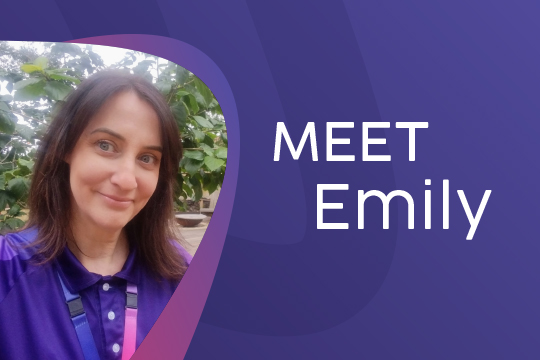Meet Emily Turner, Speech Pathologist Clinical Advisor based at Rocky Bay’s Mosman Park hub. Emily started her career as a Speech Pathologist with Rocky Bay after completing a master’s degree in 2019.
As well as supporting customers with speech therapy, Emily is also the Clinic Coordinator of Rocky Bay’s new autism assessment clinic, which is currently taking expressions of interest!
In the clinics, a team of our clinicians conduct diagnostic assessments, and once a diagnosis is confirmed by a paediatrician it can be used for families to apply for NDIS funded services. Rocky Bay’s autism assessment clinics are open for children ages from 3-17 years, if a referral from a GP or paediatrician has been obtained.
Find out more about Emily’s role as Speech Pathologist, and her involvement with our autism assessment clinics, with our Q&A!
What does your role involve at Rocky Bay, and what’s a typical day for you?
I’m part of the Mosman Park therapy team in the role of Speech Pathologist Clinical Adviser (Autism), and also acting in the role of Coordinator for our Autism Diagnostic Clinic.
In the clinic we tend to see younger children, while in my substantive role I provide support to teens and adults, so it’s wonderful to have the opportunity to work across the lifespan. My days are typically pretty jam packed – of course supporting customers face-to-face, but also working collaboratively within a team of therapists and other stakeholders to achieve customer goals or come to a consensus diagnosis. Also developing resources and being involved in projects, such as the Neurodiversity Working Party. No two days are the same!
Tell us more about your role in Rocky Bay’s new Autism Assessment Clinic?
The clinic is a passion of mine and two other wonderful Rocky Bay clinicians, Katiane Martinez (Advanced Clinician – Early Childhood Speech Pathologist) and Hannah Sljivic (Occupational Therapist), that has been in development over the last 18-months.
In my own practice, I found myself taking a particular interest in autism and being drawn to pursue further study to better understand my autistic customers, and ultimately be able to provide them with better support.
The demand for diagnostic services became obvious, and so the idea for Rocky Bay to expand its offering to include assessments led to my completion of a Graduate Certificate in Autism Diagnosis and the birth of a special project – a diagnostic clinic!
In addition to performing multidisciplinary team diagnostic assessments, as Clinic Coordinator I also review clinical information provided by families seeking assessment to evaluate suitability for our service, and then triage those applications according to prioritisation criteria. I also ensure our service adheres to best practice guidelines and provides an excellent, contemporary service.
What do the clinics involve for a customer receiving an assessment?
The diagnostic journey begins by submitting an expression of interest on Rocky Bay’s website – customers can do this independently or with support from Customer Engagement or their key contact if they are an existing customer.
We then ask families to provide us with detailed information from pregnancy and beyond, outlining strengths and challenges. This information is then reviewed to ensure an assessment is warranted and our service is well suited to the customer, and we then book in a face-to-face assessment.
These appointments take up to three hours, providing opportunity for a psychologist and a speech pathologist or occupational therapist to spend time with both the individual and their caregiver, to get a well-rounded understanding of the person being assessed. The assessment team then meet and discuss the findings to form a consensus on whether the criteria for a diagnosis of autism has been met, or not. We then complete a comprehensive report and meet with the family again to discuss the outcome and offer recommendations for next steps and supports.
What do you love most about your role as a Speech Pathologist, and as coordinator of the clinics?
In both roles, I love that I am always learning be it via actively pursuing further credentials, being surrounded by a knowledgeable and passionate multidisciplinary team who are willing to share what they know, or learning from my customers who share their insight into living with a disability. Having the opportunity to be challenged and grow is rewarding.
Finally, what are three things you can’t live without and why?
Espresso, long mac and flat white – that’s three things, right?!
